TW: Racial violence, enslavement, illegal occupation
Though I share some of Anarcha’s brutal and devastating experience of enslavement and birth related injuries, I promise we end on Black artistry and Black excellence. Please protect your peace where needed as that is the most important thing. ❤️
My family and I live near multiple military installations, two of which are aviation based resulting in the airspace above our home often becoming an invisible militarized highway, ranging from the familiar sights and sounds of the Boeing 757 to the deafening sonic boom of rockets too quick to glimpse leaving our atmosphere under the cover of the clouds. Lately, there has been an uptick of fighter jets roaring by, so unbearably loud all conversation and thought must cease for five to ten seconds depending on the pathing and participation. At first we would run out of the house to try and catch a glimpse of the millions-of-taxpayer-dollars whizzing through the sky, awed by the sheer imposition of those mechanical birds. My daughter and I excitedly shouting at the beauty of the sun sparkles gleaming off the shiny machinery, observing the way in which the entire earth—or at least the section of earth that we currently call home—responds to the aerial beasts by emitting vibrations and low grumbles. Though the jets are all consuming, that consumption usually feels like safety and awe. And that is where my privilege lies.1
After the first few excited scrambles to witness the booming wonders, the sickening realization that my perception of those brutes was all based on luck began to set in. If I were a mother in Palestine, for instance, the sound of the roaring fighter jet would usually be followed by the devastating cacophony of noises that accompany explosions. The roar, the whizz, the booms, the screams, the absolute horror. Something I’ve only witnessed via Hollywood dramatization or through the brave journalists actively covering the illegal occupation. As I clutched my daughter in excitement, I thought of all the mothers clutching their children in all-consuming fear. Perpetual trauma and harm for thee but not for me. I was born here, they were born there. I get to feel excitement, they are forced to feel fear.
Between the time that this was written and the time that it publishes an estimated 3,0002 souls will have been extinguished. Seventy percent of which will be women and children.3 Mother’s clutching babies, warned of the incoming peril by the same sound my baby and I find awe in.
Needless to say, I am no longer awestruck.
The minimization and erasure of the mother isn’t new. Ancient male-centric thought primed modern day misogynists to believe that women are but incubators of the male seed. Aristotle firmly laying this foundation when he argued that males provide the ‘form’ (akin to soul) with their semen, while females simply provide the ‘matter.’ As Dr. Jenni Nuttall summarizes perfectly, “the male is active and independent, informing (in the sense of organising and giving meaning to) female stuff which waits passively, dependently.” Men are the architect, women are the putty. Men are the artists, Mother Earth is a blank canvas. The same false narratives the patriarchy continually perpetuates. See: Conservative men being the ‘family vote’ and the climate crisis.
Then, as now, the mother is almost entirely erased from the conversation. Ancient thoughts threaded into modern practice as made evident in the United States’ rising maternal mortality rates and lack of access to reproductive healthcare, which both disproportionately impact Black women.4 Dr. Rainford, author of Pregnant While Black: Advancing Justice for Maternal Health in America, says implicit bias is a contributing factor, “citing stories in the news about Black women and families who say doctors ignored their reports of symptoms and requests for help.”5 It is clear exactly which mother this white-supremacist capitalistic patriarchal nation wishes to “protect,” staunchly advocating and passing legislation veiled in the language of traditional values while ensuring it can also be utilized to further criminalize Black bodies.6
As we step back and look at the individual threads weaving through the tapestry of Herstory, we find that there are too often outdated textiles still in use today. Ones which cause harm, no longer fitting the modern aesthetic, yet industriously linking us to mothers past. As we witness the criminalization of reproductive healthcare within the United States—and individually experience and process the collective trauma which ensues—we are stitched into the same arras alongside women such as St. Brigid7 in the 5th century and Margery Jourdemayne in the 15th. From Trota of Salerno in the 12th century to Anarcha, an enslaved woman in 19th century Montgomery, Alabama. Each of these women impacted—and was personally impacted by—women’s reproductive healthcare, yet each of them met different fates: canonized, burned, erased, and tortured.
The Father Mothers of Gynecology
In the latter half of the Middle Ages the word gossip was used to describe a woman that attended to a pregnant woman in her birthing chamber. These women, the gossips, were the support system for the laboring mother, providing not only community, but comfort and aid during a very isolating time. “In the realms of religion, menstruation [and childbirth] rendered [a woman] unclean and untouchable”8, which meant for most of the highly religious medieval period, birthing was strictly a woman’s activity, supported by gossips and aided in the delivery process by experienced midwives. Men were barred from entering, with doctors being admitted only under the most dire of circumstances, often offering advice from behind a partition or a closed door.9 Women were the keepers of women and new life. Women were the bearers of grief if that new life, or mother, did not survive. Women witnessed women’s deep vulnerability and immense strength.
Gossip, morphing from the earlier godzybbe and godsibbas10, which was a name given to a God parent or support person for a new bairn, was a word that delineated a person of support, whether that was a pal of any gender or a woman holding another’s hand through the overpowering waves of contractions. Though it started as a positive, once the word became strictly associated to women, it began to depreciate and warped into a word that would harbor condemnation. Moving from pain-distraction and support system to gendered idle chatter to be frowned upon, gossip as a word experienced exactly what happens to women’s words in a patriarchy: What once uplifts, now condemns. The feminine becomes devalued.
During these years of strict birth rituals, midwives were the keepers of birth knowledge, bringing other women into the fold and passing this sacred information from person-to-person. Because women were restricted in terms of education in most of Europe, this knowledge was often transmitted orally and through hands-on training. However, “in the 11th century, a woman named Tortola11 wrote so practical a treatise on gynecology and midwifery that, for several centuries, it was referenced as the great authoritative textbook. Her methods for cesarean section and surgery of the perineum are classic descriptions”12 which still influence medicine today.
This collection of widely translated texts, known informally as The Trotula or formally as De Passionibus Mulierium, was unique in a few ways: It was the first dedicated medical treaties and interventions written specifically for women by women. It utilized “application of investigative thinking and deduction that led to important advances such as the use of healing by secondary intention,” ideas that modern medicine still practice and build upon today.13 And it allowed the menstrual cycle to shed it’s Aristotelian misogynistic layer and rebranded it as blooming “flowers”, because “just as trees do not bear fruit without flowers, so women without flowers are frustrated on their purpose of conception.”14
For nearly 500 years Trota of Salerno’s collection of texts was the definitive guide to all things gynecological15. Trota was a “Magistra of Medicine at the School of Salerno, [and] ran a prolific clinical practice.” The access which she and her students had as midwives to pregnant and birthing women allowed them to develop treatments for common wounds such as perineal tearing and uterine ruptures. “[Trota] developed and documented a wide variety of herbal and animal remedies for the prevention and care of infectious wounds. For labor pains, she also developed a variety of opiates, which were extended to deal with general postoperative pain as well.” The ‘climate of tolerance’ that existed within Salerno at this time (circa 11C, but documented long before then) allowed Trota to be informed by “the cultural influences of Arabs, Jews, Greeks, and Romans [which] all coalesced to support intellectual and academic achievements,” as well as providing a setting for other women enthusiastic about learning and healing to take up space.16 The success Trota was able to achieve—with that impact still felt today in the 21st century—was due to the very thing conservatives are fighting against in 2024: diversity.
Trota’s domination of the gynecological field wanned when “a significant revision by Ambrose Paré’s assistant” was released in the early 1600s. Yet for at least 400 years, her words were the gynecological bible, informing readers of every gender while also becoming the foundation many modern practices are built upon. Yet to reuse Trota’s own word—with a Miley Cyrus spin to it—she never received her flowers. Trota didn’t become the Foremother of Gynecology, nor was that distinction offered to any of the surgical women and midwives hailing from that strip of land for the thousands of years prior to Trota stepping onto the scene.17
As we often discuss here, so much of the world’s written history is dominated by the colonization of Euro-centric Great Men and the erasure of all that came before them. In 1849 a man in Alabama invented the speculum—that beak-esque object which puts our cervix on full display—and today statues of him stand in multiple cities around the United States, honoring him with the designation The Father of Gynecology. That man’s name was James Marion Sims.18
Anarcha, Lucy, and Betsy
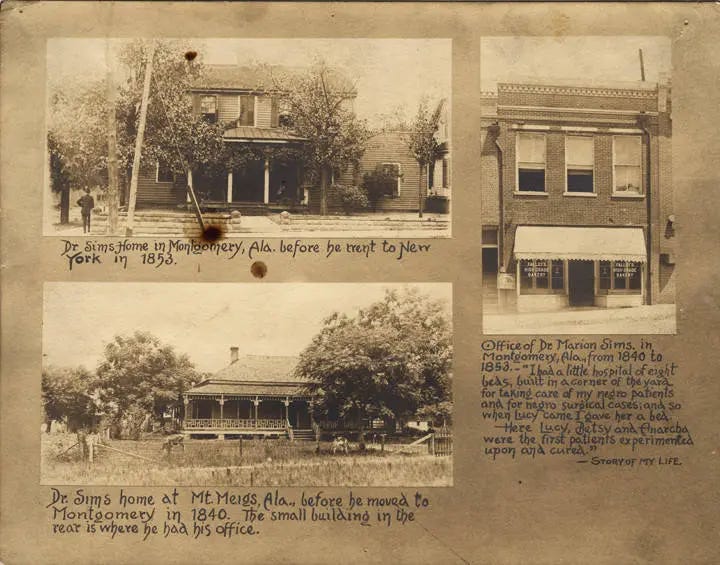
In the spring of 1845, seventeen year old Anarcha, an enslaved woman on a Montgomery, Alabama plantation, found herself fighting for her life to deliver her baby. “When labor extended beyond seventy-two hours, Anarcha’s enslavers solicited the help of Dr. [James Marion] Sims. Sims was known to have an aversion to ‘investigating the organs of the female pelvis,’ but he was the best in town with surgical implements.”19 Sims was able to deliver Anarcha’s baby through the utilization of forceps, but unfortunately, history does not record if her baby survived.
Because of the prolonged obstruction, Anarcha developed a condition known as an obstetric fistula, which are incredibly painful and renders inflicted women nearly immobile. Anarcha’s enslaver, catalyzed by the loss of Anarcha’s labor production and labor reproduction and encouraged by the participation of fellow enslavers, implored Dr. Sims to find a cure. This drive for medical advancement on behalf of these women was not done out of empathy or compassion, but out of greed, a core value of a patriarchal society. For these men only viewed the women they enslaved as property, and because of these fistulas, their property was depreciating.
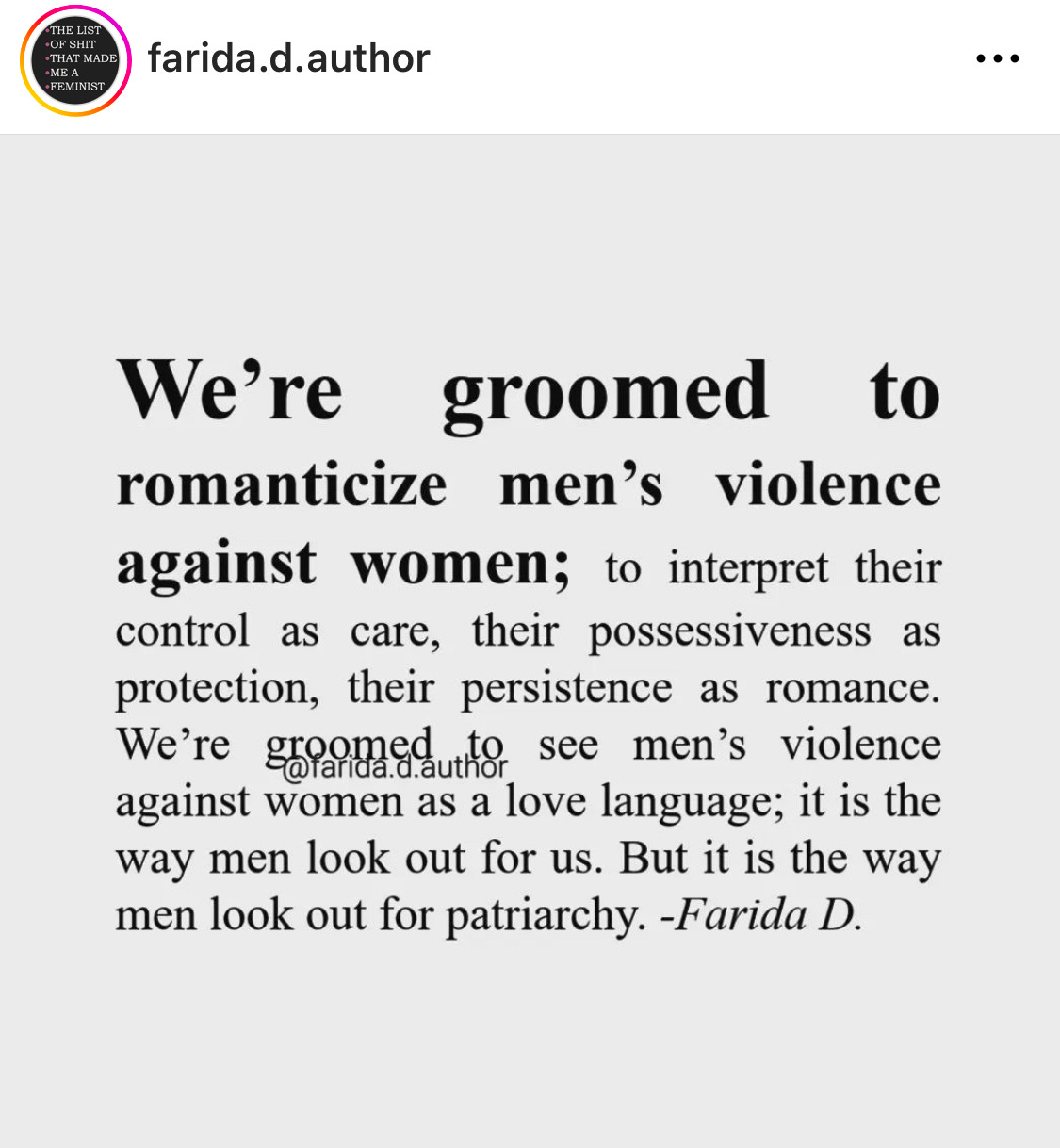
“While at least ten women endured Sims’s trials and errors, Anarcha underwent the most experiments—as many as 30 procedures in three-and-a-half years, all without treatment for pain, and often to an audience of curious doctors. While anesthetics were not widely available at the time, Sims was aware of the painkilling effects of opium and nitrous oxide—nevertheless, he believed the surgeries were ‘not painful enough to justify the trouble, and risk.’”20 Not painful enough to justify the trouble. Sims was not the original practitioner of misogynoir, but he did firmly stitch it into the trappings of the medical field, creating precedence that is still actualized today.
Physician, scholar, activist, and international expert on racial disparities within healthcare, Dr. Venessa Northington Gamble, shared in a 2016 NPR interview21 that “Black kids with fractures go into an emergency room and do not get the same level of anesthesia as white kids.” ‘Do not get the same level of anesthesia as white kids’ and ‘not painful enough to justify the trouble’. 170 years may separate the two quotes, but American healthcare is still perpetuating the same harmful stereotypes rooted in the same racist systems. The Hippocratic oath may not exactly say “first, do no harm”, but it does remind physicians to “abstain from whatever is deleterious and mischievous.”22 Is racism not deleterious?

GAMBLE: “These women were property. These women could not consent.”
As Anna Malaika Tubbs poignantly states within her introduction to The Three Mothers: How the Mothers of Martin Luther King Jr, Malcolm X, and James Baldwin Shaped a Nation, “Black motherhood in the United States is inextricable from a history of violence against Black people.” Anarcha, alongside fellow enslaved women such as Lucy and Betsy “were treated like animals and their pain was ignored.”23 Sims and other doctors harmed and abused in the name of medical advancement and for too long have been given generous honorifics while the trauma they perpetuated is swept under the proverbial rug. But Black activists have fought back.
In 2018 Sims’ statue that was once proudly standing in NYC was hauled away, face covered, after years of protests led by Black activist groups. Author Anna Malaika Tubbs places Black motherhood back into the spotlight in her breathtaking book The Three Mothers, highlighting how the mothers of Civil Rights titans are too often neglected in the story-telling of great men. In 2021 artist Michelle Browder erected a 15 foot statue in Montgomery, Alabama, honoring Anarcha, Lucy, and Betsy, and reclaiming the designation so rightfully owed to them and the other enslaved women who endured Sims’ quest for medical fame: The Mothers of Gynecology.
Trota of Salerno may have given the world its flowers, but her legacy has been obscured and nearly erased, relegated to the margins like too many women throughout history. Like Anarcha, Betsy, and Lucy, a so-called Great Man’s contribution overshadowed that of the far more significant one made by women. However, Trota’s participation in the medical field was voluntary and passion-based, not a nonconsensual act of greed born out of white-supremacist values, an important distinction. A single revision of a revered manuscript spanning centuries led to the gradual eclipse of Trota's name from historical annals. This Foremother of Gynecology, in the tapestry of the eleventh century, held a wisdom that eluded Sims 750 years later: true healing springs from the well of community and compassion.
This Black History Month, may we follow Michelle Browder’s lead and uplift Anarcha, Betsy, and Lucy’s name and legacy. Cheers to creating a future where Black women do not need to be resilient, but can just be.
A space for gratitude
Thank you to my five wonderful pledges, your support touches my heart and makes me feel so seen. The intention behind the support warmed me akin to sitting in my favorite chair, basking in the sun-beam sneaking through the book-lined window. Thank you for that warmth and energy @Beth Anne, @Sheryllilke,
, @Flowershouse, and .❤️ 24This publication will always remain free and accessible. After years of working in adult education, I believe it is imperative we move to a more accessible future—both in regards to embracing the diversity of human expression and in creating a world that allows all of us a space to belong. Education should be accessible to anyone that wants it, not hidden behind paywalls meant only for the already privileged. With that said, I will one day turn paid subscriptions on simply as a way to support my writing, all content will remain accessible to all subscribers. Thank you, again, for spending time with my words.
Further Reading/Watching/Listening
Read more about Anarcha, Lucy, and Betsy and the efforts of The More Up Campus initiative from Michelle Browder herself at anarchalucybetsey.org
- ’s recent piece titled The Burden of Needing Perfection reminds us of the great need for intentional, intersectional feminism. If our fight doesn’t include every human, then we are just fighting to remain the oppressors of someone else.
- ’s Well that didn't age well: The perils of revisiting old movies is a must read and a deeply vulnerable piece that truly exposes our need to redefine the entertainment industry through a trauma-informed lens. “I just wish it would love me back” made me feel. Thank you for sharing your experience with media consumption tainted by islamophobia, Noha, and allowing us to grow through your paradigm.
Remembering Anarcha, Lucy, and Betsey: The Mothers of Modern Gynecology - a 2016 NPR interview with Dr. Vanessa Northington Gamble whom is quoted within this essay
- ’s poem Friend to Dragons is a beautiful reflection of a mother witnessing her son navigating masculinity in a patriarchal world and what that cruel world tries to take from young boys. It is so gorgeous and can be read here:
I’m a white woman living in the United States, there is a lot of unearned privilege there
https://www.oxfam.org/en/press-releases/daily-death-rate-gaza-higher-any-other-major-21st-century-conflict-oxfam
https://apnews.com/article/women-children-gaza-war-victims-un-inequality-f0f89a724543b99c2c22439e7af09405
https://www.nytimes.com/2023/11/20/world/middleeast/palestinian-pregnant-women-childbirthgaza.html#:~:text=Women%2C%20children%20and%20newborns%20in,of%20a%20few%20weeks%2C%20Ms.
https://www.yalemedicine.org/news/maternal-mortality-on-the-rise
https://www.jstor.org/stable/j.ctv2phpsbz
As we saw in the case brought against Brittany Watts - https://www.nbcnews.com/news/us-news/black-woman-ohio-was-charged-miscarrying-bathroom-experts-warn-dangero-rcna130649
Woman Defamed and Woman Defended: An Anthology of Medieval Texts edited by Alcuin Blamires, 1992
This depended on the status of the woman and the privileges she was afforded
https://www.oed.com/dictionary/gossip_n?tab=meaning_and_use&show-all-quotations=true
Because record of Trota’s life is so limited, often her name is used interchangeably with the text she authored. I tried to match the source spelling, but I tend to lean towards Trota in place of Trotola or Trotula when referring to the woman herself.
Women in Surgery An Ancient Tradition by Janis A. Pastena, MD
The Women of Salerno: Contribution to the Origins of Surgery From Medieval Italy by Zoe Alaina Ferraris, BA, and Victor A. Ferraris, MD, PhD
Woman Defamed and Woman Defended: An Anthology of Medieval Texts edited by Alcuin Blamires, 1992
Part of this text also included one of the earliest, if not the earliest, recording of beauty tips making evident beauty culture and patriarchy are boon companions in oppression.
Women in Surgery An Ancient Tradition by Janis A. Pastena, MD
Ibid.
https://www.anarchalucybetsey.org/
Ibid.
https://www.npr.org/transcripts/466942135
Ibid.
https://www.health.harvard.edu/blog/first-do-no-harm-201510138421
The Three Mothers: How the Mothers of Martin Luther King, Jr., Malcolm X, and James Baldwin Shaped a Nation by Anna Malaika Tubbs, 2021
Realizing now I’m not entirely sure how to tag people correctly each time. If I messed this up, please do let me know! Thank you!

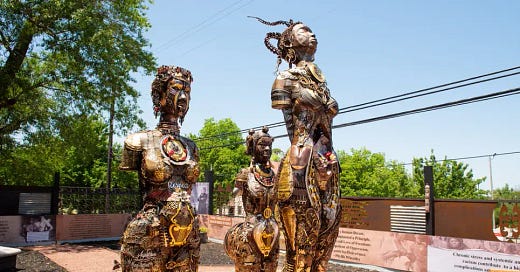





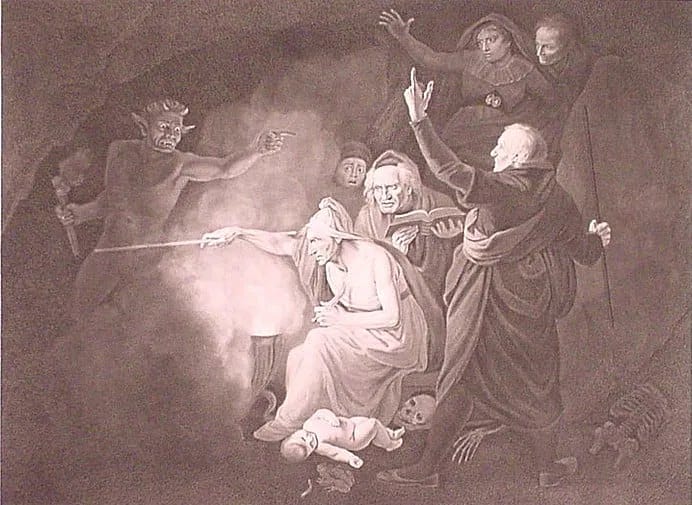


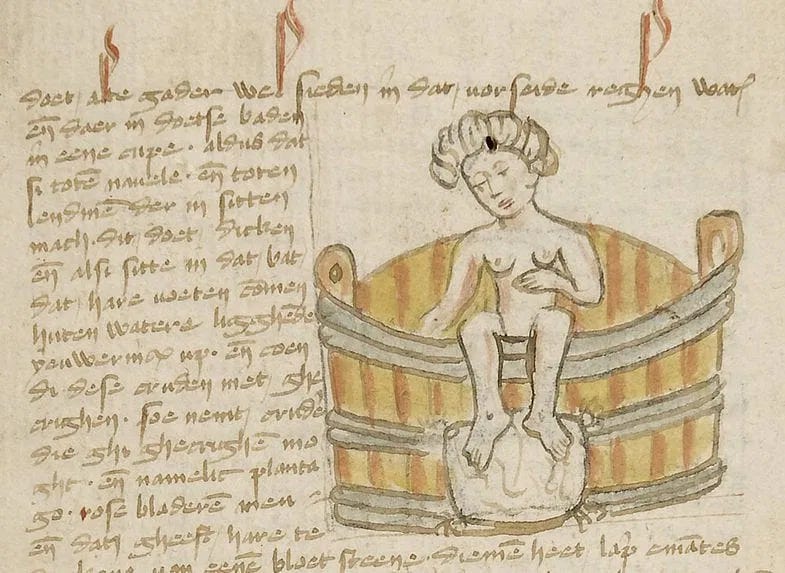
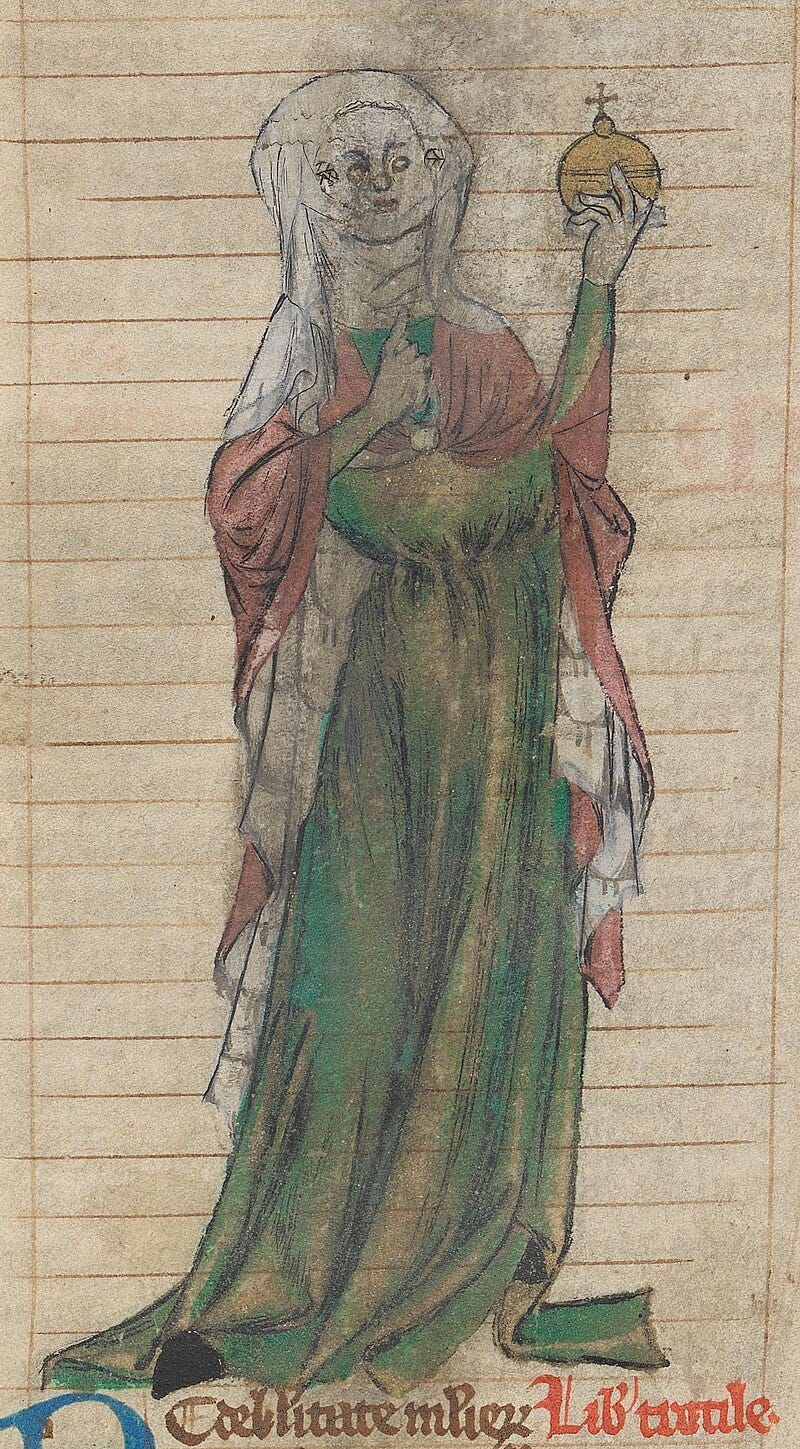












You are so talented and wise. Your work is really meaningful and appreciated! I need to find the source but I read somewhere that in fmri studies, the part of the infants brain which lights up when their mom responds to their cry is the same as nuns when they pray. As far as i’m concerned mother (and earth) are the closest things to god. In them we can connect most closely to life itself
This is an astonishing piece, impeccably researched. I was pulled in from the very beginning and couldn't stop reading until the end. I'm ashamed of how little of these specifics I knew going into this. Thank you for teaching me.